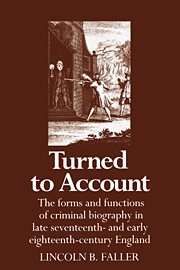 Turned to Account
Turned to Account Book contents
- Frontmatter
- Contents
- Preface
- Part I Turning criminals to account: three case histories and two myths of crime
- Part II Enucleating the truth: the criminal as sinner turned saint
- Part III Palliating his crimes: the thief as various rogues
- Postscript: Criminal biography and the novel
- Appendix I Who read the popular literature of crime?
- Appendix II The politics of thieving
- Notes
- Select bibliography
- Index
Part I - Turning criminals to account: three case histories and two myths of crime
Published online by Cambridge University Press: 05 February 2012
- Frontmatter
- Contents
- Preface
- Part I Turning criminals to account: three case histories and two myths of crime
- Part II Enucleating the truth: the criminal as sinner turned saint
- Part III Palliating his crimes: the thief as various rogues
- Postscript: Criminal biography and the novel
- Appendix I Who read the popular literature of crime?
- Appendix II The politics of thieving
- Notes
- Select bibliography
- Index
Summary
Every man by nature hath a lusting desire to leave God, and live at his own hand; he would stand on his own legs and bottom, and be at his own dispose: Thus it is with every man by Nature…. Man would be at liberty from God and his Will, to follow and fulfill his own…. He hath a principium laesum, a devilish principle in his nature; an impulse to range about the earth, as Satan said of himself.
Obadiah Grew, Meditations upon our Saviour's Parable of the Prodigal Son (1678), pp. 44, 46All thieves and Murderers … may come under the Denomination of Rebels.
Paul Lorrain, Ordinary Account, 6 June 1707Myth … [has] often been declared to be a mere product of fear. But what is most essential … is not the fact of fear, but the metamorphosis of fear. Fear … can never be completely overcome or suppressed, but it can change its form. Myth is filled with the most violent emotions and the most frightful visions. But in myth man begins to learn a new and strange art: the art of expressing, and that means organizing, his most deeply rooted instincts, his hopes and fears.
Ernst Cassirer, The Myth of the State, pp. 46–47Myth Junctions especially where there is a sociological strain.
Bronislaw Malinowski, Myth in Primitive Psychology, p. 126After he was hanged and before he was quartered, Captain James Hind was disemboweled for committing high treason against the Commonwealth of England.
- Type
- Chapter
- Information
- Turned to AccountThe Forms and Functions of Criminal Biography in Late Seventeenth- and Early Eighteenth-Century England, pp. 1 - 5Publisher: Cambridge University PressPrint publication year: 1987
